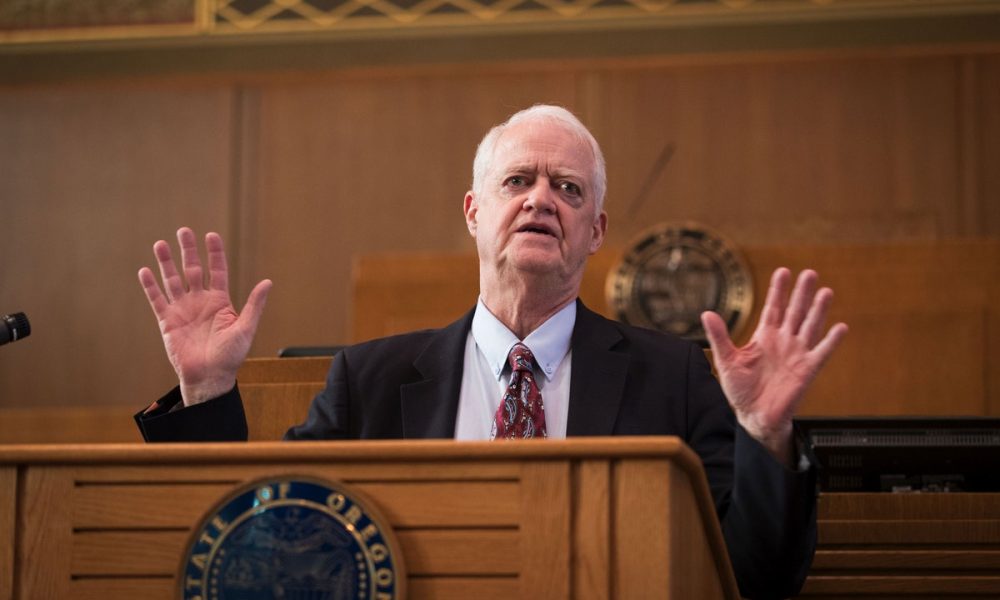
As a state representative in 1983, Peter Courtney introduced legislation to lower the drunk driving threshold from .10 blood alcohol content to .08.
It was a radical move from a new lawmaker who was expected to bide his time. Courtney had little support outside of a budding advocacy group called Mothers Against Drunk Driving, but he introduced the bill anyway.
It passed and Oregon and Utah became the first states to move to a .08 threshold for drunk driving. Courtney proved to be ahead of the times, as it wasn’t until 1998 that President Bill Clinton called on all states to enact the .08 standard.
Now Courtney wants Oregon to be a leader again. He is taking the political point to push Oregon to an even more strict limit — .05.
“You’re not as good after you drink as you are before you drink,” he said.
Today, Courtney said, drivers are confronted in their cars with more lights and screens than ever. Add in bike lanes and homeless people walking around at night, and there is too much distraction while driving something that can be used as a deadly weapon, he said.
He knows his proposal will be unpopular.
“Sooner or later, you’re going to have to fight that battle,” Courtney said. “You don’t wait until the timing’s perfect. You don’t wait until everything lines up.”
Courtney said he’s always been keenly aware of the downsides of alcohol, which has killed several chronic drinkers in his family. But this isn’t about drinking, it’s about safety, he said.
“I’m not trying to stop you from drinking,” Courtney said. “I’m not trying to stop this explosion of brew pubs. Go, all of you. Go tonight, go every night. I’m not trying to make a statement about drinking.”
Utah is the only state with such a standard, which went into effect Dec. 30 after nearly two years of hot debate and pushback from the restaurant industry, citizens and some lawmakers.
That was in teetotalling Utah, where the religious beliefs of two-thirds of the state mandate they abstain from alcohol. It was even fought before a Mormon-dominated legislature, prompting former Sen. Jim Dabakis to famously drink two mimosas before a floor speech to show he wasn’t impaired.
So far, Courtney is missing crucial allies.
Mothers Against Drunk Driving so far isn’t endorsing the Courtney move and Oregon State Police are “neutral” on the idea. Capt. Tim Fox said there is no research on the difference of impairment at .05 and .08. Superintendent Travis Hampton said if the new limit were to pass, OSP wouldn’t have enough troopers to enforce the new law.
Courtney is undeterred.
“I’ll be talking with him,” Courtney said of Hampton.
And that’s the law enforcement and anti-drunk driving community. Oregon also has robust wine, craft beer, spirits and restaurant industries with powerful lobbies.
Greg Astley, the government affairs director for the Oregon Restaurant and Lodging Association, said proposal misses the mark, saying a 120-pound woman could get arrested for having one glass of wine after work.
Courtney’s office says it would take a 160-pound man three drinks in an hour to get to .05. He also points to the National Transportation Safety Board, which has been promoting .05 since 2013, which says someone between .05 and .079 blood alcohol content is seven times more likely to be involved in a fatal crash than a sober driver.
A University of Chicago study based on data from international countries with a .05 limit estimated 1,790 lives would be saved each year if all states adopted a .05 limit. In 2016 there were 2,636 crashes involving drinking in Oregon, causing 154 deaths.
Drivers can be cited for being under the influence of less than .08 but the penalties are less severe. In 2017, of the 4,671 DUI arrest, 184 drivers registered less than. 08, according to OSP data.
The penalties that apply to the current limit would also be linked to the lower limit under Courtney’s proposed legislation. That means drivers involved in fatal accidents who are found to be impaired at the .05 level could face negligent homicide charges.
Astley said reducing the limit could make people fearful of going to happy hour or ordering a drink with dinner. Meanwhile, he said, there are more and more people under the influence of marijuana getting behind the wheel.
“It seems like this bill is trying to zero in on a very narrow subset of people that under current law wouldn’t be impaired,” he said.
But Courtney said this increased regulation is part of the progression of society. With ridesharing apps like Uber and Lyft, it’s easier than ever to not drive after drinking. It’s a practice he’s started himself.
In recent years, New York, Delaware, Hawaii and Washington considered but rejected moves to the lower limit.
Courtney acknowledged that may be the fate his idea endures in Oregon.
“Well alright then, I’ll lose, but I’m still not pulling the bill,” he said.
Reporter Aubrey Wieber: [email protected] or 503-575-1251.
A note from our editor:
Thank you for reading another example of our local journalism. This kind of work takes paid professionals and we rely on subscribers to support this work. If you haven’t yet signed on as a Salem Reporter subscriber, please ensure you get more of these kinds of stories with your subscription: Click HERE. Thank you. — Les Zaitz, editor









